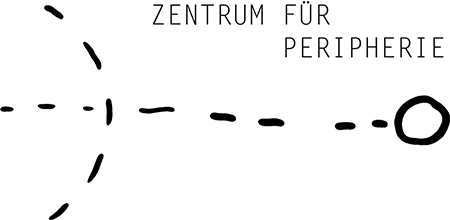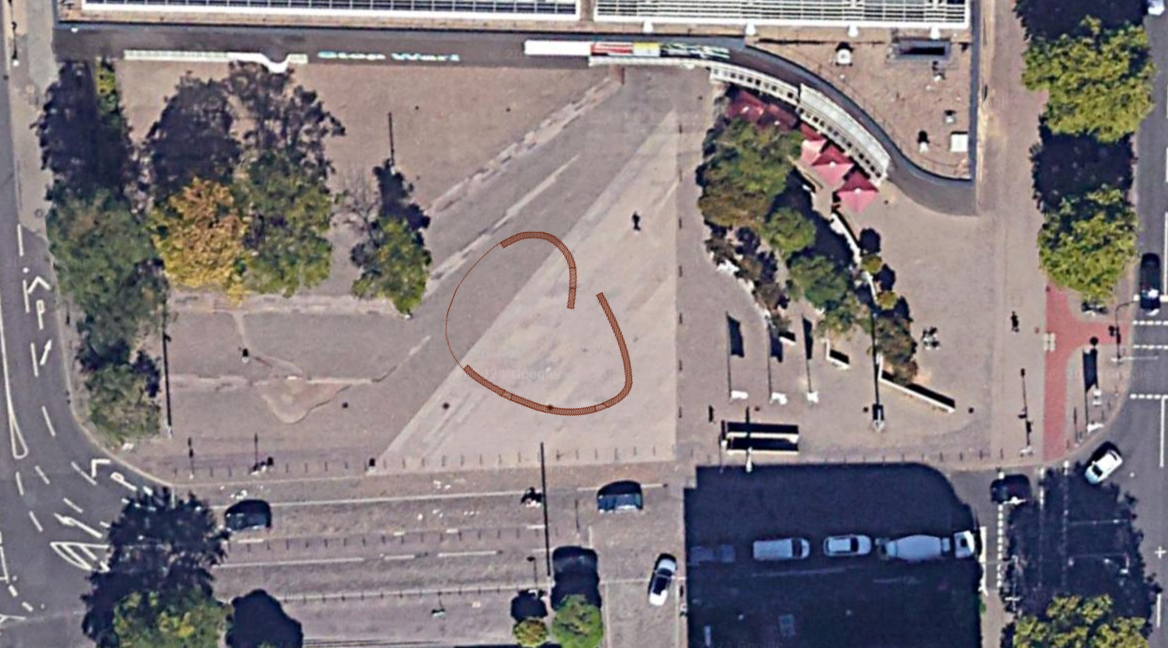WIESENCAFÉ – Laboratory for Innovation
on Grabbeplatz in Düsseldorf
Grabbeplatz 5, 40213 Düsseldorf
Monday and Tuesday, 29 and 30 April 2024
9:30 a.m. – 4:00 p.m.
The Wiesencafé – Laboratory for Innovation moved its location from Garath to the city centre for two days and opened on Grabbeplatz in front of the Kunstsammlung NRW on 29 and 30 April. Düsseldorf residents of all ages were invited. On Grabbeplatz in front of the Kunstsammlung NRW, for two days, the bases of the walls were recreated in their original dimensions.
The Grabbeplatz with the floor plan of the Wiesencafé built for two days (photo montage)
One particular focus was the topic of “Building with excavated soil”, as the Garather Wiesencafé is to be built using the cob as construction method. On Monday, interested people were able to bring soil samples to Grabbeplatz to have them analysed for their suitability for corrugated earth construction. The samples were measured for values with 55 g/cm², 63.8 g/cm², from Lower Rhine; 104 g/cm², 87 g/cm², 112 g/cm², 91 g/cm² from various sites, Carl-Friedrich-Goerdeler Straße, Düsseldorf-Garath.
Morning programme
9:00 a.m. – 12:00 noon
Laboratory for innovation in operations
12:30 p.m. – 01:30 p.m.
Snack Wiesencafé with Kevin Kutsch and the AHS
Programme Tuesday 30 April
12:00 noon – 12:30 p.m.
Children and young people from the Alfred-Herrhausen-Schule in Garath and the project partners Düsseldorf University of Applied Sciences under the leadership of PBSA; Schulkunst e.V.; Zentrum für Peripherie NRW e.V.; and Städtische Wohnungsgesellschaft as property developer give an insight into the Wiesencafé.
12:30 p.m. – 01:30 p.m.
Snack Wiesencafé with Kevin Kutsch and the AHS
01:30 p.m. – 03:00 p.m.
Discussion on the Wiesencafé as a dialogue between contemporary art, education, crafts, building culture, materials research and architecture
with Francesco Apuzzo, raumlaborberlin; Prof. Karl Heinz Einberger, HSWT; Alban Fangmeier, Kevin Kutsch and other PBSA students; Klaus Feldhaus, Städtische Wohnungsgesellschaft Düsseldorf; M.Sc. Leonie Gleiser Institut für Baustoffe, TU Dresden; Prof. Dr. Katja Gramelt, Department of Cultural and Social Sciences, HSD; Nicolas Grosch, Head of the Office of the Düsseldorf Art Commission; Christiane Hellmann, Emschergenossenschaft, Soil Management Department; Franz Klein-Wiele, Workshop for Model Making and Prototypes, PBSA / Düsseldorf University of Applied Sciences; Markus Lehrmann, NRW Chamber of Architects; Dr.- Ing. Jan Mittelstädt, SNW Ingenieure, Berlin; Ute Reeh, Centre for Periphery; Prof. Judith Reitz, Dean PBSA/ Hochschule Düsseldorf; Christof Rose, Architektenkammer NRW; Susanna Schoenberg, Kunstakademie Düsseldorf; Carl-Friedrich Schöer, Eiskellerberg TV; Jasmin Vogel, Kulturforum Witten; Uwe Warnecke, Member of the City Council of Düsseldorf; students of the Department of Culture and Social Sciences HSD; students of the Kunstakademie Düsseldorf; children, young people and teachers from the Alfred-Herrhausen-Schule and the Görres-Gymnasium Düsseldorf and all other guests.
Moderation: Peter Köddermann, Baukultur NRW
About the WIESENCAFÉ
The idea for the Wiesencafé on Wittenberger Weg in Garath was formulated by young people from the neighbourhood in 2013. They discovered that their neighbourhood on Wittenberger Weg in Garath lacked a self-designed, active centre. A place where you can get something to eat, a place where their own culture is visible, an open place that is a meeting point also for people “from outside”.
The Wiesencafé as a “LABORATORY FOR INNOVATION” is a place for culture and collaboration, an interdisciplinary project with a participatory educational focus, an experimental laboratory for transdisciplinary research. The Wiesencafé laboratory is open to people of all ages and backgrounds.
The Wiesencafé is located on the border between Garath and Benrath in Düsseldorf, opposite a large industrial wasteland that is to be transformed into a new residential neighbourhood over the next ten years. The Wiesencafé is conceived as a “third place” meeting point, a place for social and cultural encounters, a place for the development of participative planning and realisation for public space. Contemporary art provides the framework for contributing one’s own ideas and expertise.
In 2025/26, the Wiesencafé on Wittenberger Weg in Garath is to be built as the first contemporary public cob building.

